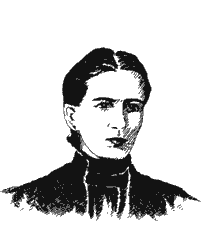| Home |
| Publications |
| Public Events |
| Press Releases |
| Reviews & Resources |
| Personnel |
| Contact |
| Orders |
| Search |
Language Lanterns wins CFUS translation prize
Language Lanterns donates books to Ukrainian universities. Details
Women's Voices in Ukrainian Literature

Dniprova Chayka
(1861-1927)
Biographical Sketch
Lyudmyla Berezyna-Vasylevska was born in southern Ukraine near the estuary of the Dnipro River. Her father was a severe and autocratic Russian village priest who made life very difficult for his family, and it was her kind and loving Ukrainian mother who protected her and nurtured her innate love of beauty.
As the family moved from village to village, Lyudmyla developed an intuitive appreciation of the rich and varied customs, beliefs, folk songs, and folk tales of her people. She received a good formal education and, after completing her schooling in a private gymnasium in Odessa, worked as a private tutor, a teacher in a village school, and a high school instructor in Odessa.
It was during this period in her life that Lyudmyla embarked on her lifelong labour of love—collecting Ukrainian folk songs and folklore materials. Her youthful enthusiasm for the oral traditions of the peasants led to her participation in an archaeological-ethnographic conference held in Odessa in 1884; at this conference the aspiring young writer presented three notebooks containing an impressive collection of folk songs.
In 1885, Lyudmyla married Feofan Vasylevsky, a Ukrainian historian and publicist, who worked as a statistician. An ardent Ukrainian patriot, he actively opposed the tsarist decrees that severely restricted the use of the Ukrainian language and impeded the development of Ukrainian literature and culture within the Russian Empire. Because of his involvement in Ukrainian organizations, he was released from his position, and the young couple fell upon hard times.
There were periods when both Lyudmyla and her husband found themselves under police surveillance because of their participation in subversive political movements. Her publications aroused the ire of the authorities; in 1905, she was arrested briefly for her writings, and her manuscripts were confiscated.
Lyudmyla Berezyna-Vasylevska, a modest and unassuming woman who wanted to protect her privacy, chose to write under the pseudonym of "Dniprova Chayka" ("The Seagull of the Dnipro"). This nom de plume was a most fitting one for a writer of a romantic bent, for not only was she born near the Dnipro River, but, in Ukrainian poetry and folk songs, the image of a lamenting seagull symbolizes a mother weeping for her children, or Ukraine bemoaning the sad fate of her people.
Dniprova Chayka published her first works—lyrical poetry, prose poems, and short stories—in journals and newspapers in both Eastern and Western Ukraine. She was strongly encouraged in her literary efforts by Ivan Franko, the leading writer and critic of the day, who held her talent in high regard. Warmly welcomed into the ranks of the literati, she counted many prominent Ukrainian writers, including the women authors featured in this series, among her friend and acquaintances.
In addition to her poetical works and short stories, Dniprova Chayka wrote poetry and fairy tales for children, and her great love of music led her to write the libretto for several children's operettas that have become Ukrainian classics, such as Koza Dereza (The Roguish Goat), Pan Kotsky (Sir Cat) and Zymova kralya (The Snow Queen). The scores for these operettas were written by Mykola Lysenko, a famous Ukrainian composer, who also set several of her lyrical poems to music and collaborated with her in transcribing the melodies of the folk songs from her collection.
Following the birth of her three children, ill health and material circumstances forced Lyudmyla Berezyna-Vasylevska to abandon her writing and devote her time and energy to the demands of motherhood. She ensured that all her children had the best possible education: her older daughter studied medicine in France, while her son and younger daughter graduated from specialized post-secondary institutes in Kyiv.
In an entry made in her personal journal in the early 1880s, the young Lyudmyla wrote: "I feel like a chrysalis that is being transformed into a butterfly. But a butterfly's wings unfold in response to the sun, warmth, and the spring air, while my wings grow in response to the love of those who surround me."
Unfortunately, although her husband was very fond of her, he did not understand her creative nature; therefore, after their children were grown, they separated and, until her death in 1927, she lived with her older daughter in Kyiv.
In addition to writing in Ukrainian, Dniprova Chayka wrote lyrical poetry in Russian and translated Russian and Swedish literature into Ukrainian. Many of her works were published posthumously on the basis of archival materials that have since been lost.
Dniprova Chayka was one of the first writers to introduce into Ukrainian literature the new literary movement of Symbolism which, by the 1890s, was spreading from France through all of Europe, and her lyrical poems and prose poems contributed to the development of Ukrainian Modernism. Her short stories, however, written under the influence of populism, belong to the ethnographic-realistic school of literature.
©1998 Language Lanterns Publications
ISBN 0-9683899-1-0
Sketch by Roma Franko; Edited by Sonia Morris
Volumes this author appears in:
